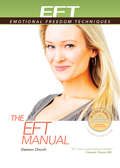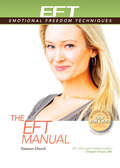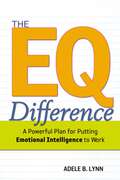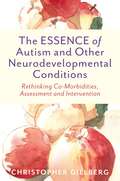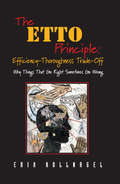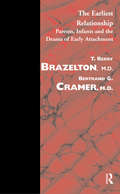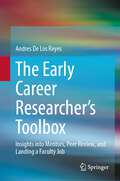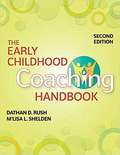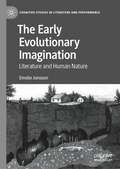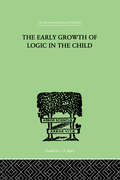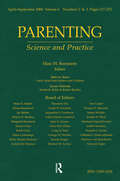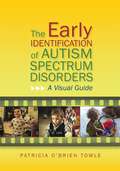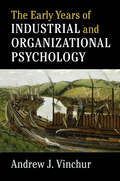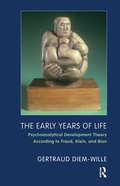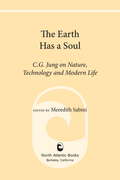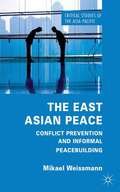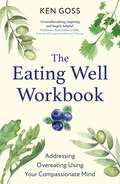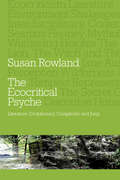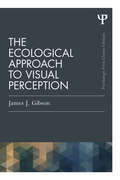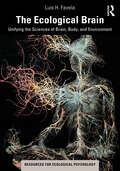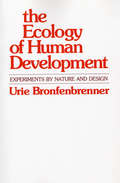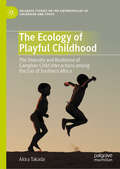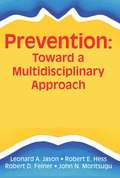- Table View
- List View
The EFT Manual
by Dawson ChurchThis is a new and completely revised edition of the original manual for Emotional Freedom Techniques (EFT), one of the most successful psychology self-help techniques ever developed. Thousands of people tell amazing stories of how it has helped them with psychological problems like anxiety, depression, phobias, and PTSD, as well as physical problems like pain and stress. Author Dawson Church is the best-known researcher in the field, and this manual is based on Clinical EFT, the only version of EFT to be validated in dozens of scientific studies. Step by step, you will learn the "evidence-based" form of EFT used in those studies. You'll discover how you can identify the hidden roots of emotional problems, and how to alleviate them using EFTs "Basic Recipe" as well as advanced techniques. This book shows you how to use Clinical EFT fo a variety of common conditions, including pain, fears, addictions and cravings, weight issues, insomnia, and guilt. With the healing keys of EFT, you'll be surprised at how many problems that hold you back can be quickly and easily relieved, opening up new possibilities for your life.
The EFT Manual
by Dawson ChurchThis is a new and completely revised edition of the original manual for Emotional Freedom Techniques (EFT), one of the most successful psychology self-help techniques ever developed. Thousands of people tell amazing stories of how it has helped them with psychological problems like anxiety, depression, phobias, and PTSD, as well as physical problems like pain and stress. Author Dawson Church is the best-known researcher in the field, and this manual is based on Clinical EFT, the only version of EFT to be validated in dozens of scientific studies. Step by step, you will learn the "evidence-based" form of EFT used in those studies. You'll discover how you can identify the hidden roots of emotional problems, and how to alleviate them using EFTs "Basic Recipe" as well as advanced techniques. This book shows you how to use Clinical EFT fo a variety of common conditions, including pain, fears, addictions and cravings, weight issues, insomnia, and guilt. With the healing keys of EFT, you'll be surprised at how many problems that hold you back can be quickly and easily relieved, opening up new possibilities for your life.
The EQ Difference: A Powerful Plan for Putting Emotional Intelligence to Work
by Adele LynnCo-published with SHRM. Emotional Intelligence (EI) is a strong indicator of individual, team, and organizational success. But stocking up on emotionally intelligent employees isn't enough: you need a concrete plan for putting this valuable resource to work. The EQ Difference offers an array of self-assessment tools and team-focused exercises that will help increase and leverage emotional intelligence both in individuals and in groups. It's filled with practical tips and suggestions for developing your own ""emotional quotient,"" as well as that of your peers, employees, and even senior executives. Featuring real workplace examples, Letters to Leaders, and excerpts from actual performance reviews that show the positive impact of EI in a variety of environments, The EQ Difference will help your organization achieve greater productivity, higher morale, and better employee retention -- all keys to stronger bottom line results.
The ESSENCE of Autism and Other Neurodevelopmental Conditions: Rethinking Co-Morbidities, Assessment, and Intervention
by Christopher GillbergESSENCE (Early Symptomatic Syndromes Eliciting Neurodevelopmental Clinical Examinations) refers to the group of neurodevelopmental disorders including autism, ADHD and tic disorders as well as conditions gaining increasing awareness such as ARFID, PANS and PANDAS.Professor of child psychiatry Christopher Gillberg describes the lifetime prognosis of ESSENCE, examining the common co-occurrence between these conditions and the symptoms they present.Whilst diagnoses are often treated in isolation, Gillberg presents these issues as an overall condition, and advises treatment and support based on a holistic approach. This book also demonstrates the need for holistic whole-person interventions and assessments to improve outcomes for people within this group.
The ETTO Principle: Why Things That Go Right Sometimes Go Wrong
by Erik HollnagelAccident investigation and risk assessment have for decades focused on the human factor, particularly 'human error'. Countless books and papers have been written about how to identify, classify, eliminate, prevent and compensate for it. This bias towards the study of performance failures, leads to a neglect of normal or 'error-free' performance and the assumption that as failures and successes have different origins there is little to be gained from studying them together. Erik Hollnagel believes this assumption is false and that safety cannot be attained only by eliminating risks and failures. The ETTO Principle looks at the common trait of people at work to adjust what they do to match the conditions - to what has happened, to what happens, and to what may happen. It proposes that this efficiency-thoroughness trade-off (ETTO) - usually sacrificing thoroughness for efficiency - is normal. While in some cases the adjustments may lead to adverse outcomes, these are due to the very same processes that produce successes, rather than to errors and malfunctions. The ETTO Principle removes the need for specialised theories and models of failure and 'human error' and offers a viable basis for effective and just approaches to both reactive and proactive safety management.
The Earliest Relationship: Parents, Infants and the Drama of Early Attachment
by T. Berry Brazelton Bertrand G. CramerNever before has research on newborn behavior and parent-infant interaction been fully integrated with psychoanalytic insight into parents' emotions and fantasies. This book provide a vivid glimpse of the parents' daydreams and narcissistic wishes which grow into a desire for a child, and they show how these feelings develop into important attachments to the unborn infant during pregnancy. The "power and competence" of the newborn born then challenges parental fantasies, desires, wishes and expectations, creating the beginnings of the bond between parent and child. Using the latest research, the authors clarify all the ways the infant participates in the dawning relationship and the ingredients of very early communication and interaction. They then unveil the "imaginary interactions" which lend meaning and drama to each gesture and expression. We see the baby as Tyrant, as Savior, or as the reincarnation of lost relationships. Everyone who cares for mothers and babies-pediatricians, developmental and clinical psychologists, psychiatrists, early childhood specialists, nurses and social workers-as well as interested parents, will find this book of immediate value.
The Early Career Researcher's Toolbox: Insights into Mentors, Peer Review, and Landing a Faculty Job
by Andres De Los ReyesThis book probes professional development issues crucial to early career researchers, beginning with advice on selecting mentors and optimizing mentoring relationships. From this foundation, the book describes how to navigate the peer-review process, particularly when publishing in academic journals, as well as build connections between the different pieces of academic work published during the early career years. It details strategies to leverage the tools of storytelling to build a research program coupled with concrete guidance on delivering job talks during academic job interviews. In addition, the book includes a feature, Anonymous Accounts, which provides real-life examples of how early career researchers experienced many aspects of their training and illustrates how to overcome obstacles on the path to success in the academic job market.Key topics featured include: Selecting and working with mentors. Navigating peer review when publishing in academic journals. Building a research program. Delivering academic job talks. The Early Career Researcher’s Toolbox is a must-have resource for graduate students, post-doctoral fellows, and aspiring undergraduate students as well as all early career and other professionals in search of a resource designed to help them succeed in the academic job market.
The Early Childhood Coaching Handbook
by Dathan D. Rush M'Lisa L. SheldenHow can you support both colleagues and families as they enhance their knowledge, develop new skills, and promote healthy development of young children? Coaching is the key—and the new edition of this bestselling guide is packed with even more practical tools to help early childhood professionals conduct skillful coaching at homes, schools, and communities. Like the popular first edition, this book walks you step‐by‐step through the five characteristics of successful coaching practices: observation, action, reflection, feedback, and joint planning. You'll learn about the essential qualities of effective coaches and discover how to adjust your coaching techniques to meet the specific needs of early childhood educators, parents, and caregivers. And you'll get cutting‐edge new content inspired by user feedback, including updated research, the latest evidence‐based practices, and almost 80 pages of sample scripts and scenarios that help you support families of children with a wider variety of diagnoses. With this practical guide to proven coaching techniques, you'll be ready to help both professionals and families support the learning and development of all young children.
The Early Evolutionary Imagination: Literature and Human Nature (Cognitive Studies in Literature and Performance)
by Emelie JonssonDarwinian evolution is an imaginative problem that has been passed down to us unsolved. It is our most powerful explanation of humanity’s place in nature, but it is also more cognitively demanding and less emotionally satisfying than any myth. From the publication of the Origin of Species in 1859, evolution has pushed our capacity for storytelling into overdrive, sparking fairy tales, adventure stories, political allegories, utopias, dystopias, social realist novels, and existential meditations. Though this influence on literature has been widely studied, it has not been explained psychologically. This book argues for the adaptive function of storytelling, integrates traditional humanist scholarship with current knowledge about the evolved and adapted human mind, and calls for literary scholars to reframe their interpretation of the first authors who responded to Darwin.
The Early Growth of Logic in the Child: Classification and Seriation (International Library Of Psychology Ser.)
by Inhelder, Brbel & Piaget, JeanFirst published in 1999. Routledge is an imprint of Taylor & Francis, an informa company.
The Early Head Start Fathers And Children
by Marc H. BornsteinThe Early Head Start Father Studies: Design, Data Collection, and Summary of Father Presence in the Lives of Infants and Toddlers, The Meaning of "Good Fatherhood:" Low-Income Fathers’ Social Constructions of Their Roles, Fathering in Infancy: Mutuality and Stability Between 8 and 16 Months, Relation Between Father Connectedness and Child Outcomes, Is One Good Parent Good Enough? Patterns of Mother and Father Parenting and Child Cognitive Outcomes at 24 and 36 Months, Two Studies of Father Involvement in Early Head Start Programs: A National Survey and a Demonstration Program Evaluation, Exposure of Low-Income Families and Their Children to Neighborhood Violence and Paternal Antisocial Behavior, Lessons Learned from Early Head Start for Fatherhood Research and Program Development
The Early Identification of Autism Spectrum Disorders: A Visual Guide
by Patricia O'Brien TowleIdentifying Autism Spectrum Disorder (ASD) as early as possible can have a significant, positive impact on the child's journey to adaptation and independence. Yet too few diagnoses take place at an early, developmentally crucial stage. This unique visual guide aims to equip readers with the skills to recognise ASD in very young children. The book provides a systematic framework for understanding the complex nature of ASD. From social interaction to communication to restricted and repetitive behaviors, each chapter focuses on key symptoms and uses photographs to illustrate and enhance understanding of presenting or absent behaviors. It is written in an accessible style and covers all of the core aspects of ASD, giving readers everything they need to be able to successfully identify the behavioral indicators of autism. A final chapter provides an overview of assessment options for young children being evaluated for possible ASD. Taking a visual approach to identifying ASD in very young children, this book will be a valuable resource for early intervention professionals and students, occupational therapists, speech and language therapists, psychologists, paediatricians, teachers as well as parents of children pre- and post-diagnosis.
The Early Years of Industrial and Organizational Psychology
by Andrew J. VinchurThis book provides a history of the origins of industrial-organizational (I-O) psychology, focusing on the late nineteenth century and early twentieth centuries. Taking an international perspective, The Early Years of Industrial-Organizational Psychology examines the context in which the field emerged, and its origins in the measurement of individual differences. Andrew J. Vinchur covers the initial applications of psychology in advertising, the study of fatigue, and especially employee selection, as well as the role industrial psychology played in World War I and the post-war expansion of the field. He also examines the education of industrial psychologists, their efforts to establish industrial psychology as a profession, and the beginnings of the organizational side of the field.
The Early Years of Life: Psychoanalytical Development Theory According to Freud, Klein, and Bion
by Gertraud Diem-WilleThis book provides a powerfully argued and beautifully constructed account of the early development of the child in the family context from a psychoanalytic perspective. It draws on the theoretical trajectory from Sigmund Freud to Melanie Klein and Wilfried Bion.
The Earth Has a Soul: C. G. Jung on Nature, Technology and Modern Life
by C. G. Jung Meredith SabiniWhile never losing sight of the rational, cultured mind, Jung speaks for the natural mind, source of the evolutionary experience and accumulated wisdom of our species. Through his own example, Jung shows how healing our own living connection with Nature contributes to the whole.
The East Asian Peace
by Mikael WeissmannUsing a case study based approach, Weissmann analyses the post-Cold War East Asian security setting to demonstrate why there is a paradoxical inter-state peace. He points out processes that have been important for the creation of a continuing relative peace in East Asia, as well as conflict prevention and peacebuilding mechanisms.
The Eating Disorder Sourcebook
by Carolyn CostinThis gives a complete study into this disorder as potentially fatal from nutritional and psychological aspects. Questions about the cause and treatment are also answered.
The Eating Well Workbook: Addressing Overeating Using Your Compassionate Mind (Compassion Focused Therapy)
by Dr Ken GossLearn to stop overeating for good and discover your own healthy weight and eating habitsThis compassionate, therapeutic workbook explores the problems created by having ready access to high fat foods designed to taste good. Because we evolved in conditions of relative scarcity, we have few natural food inhibitors and so most diet books try to encourage people to limit their eating using strict rules which have to be constantly worked at.However, this can lead to self-criticism which can undermine efforts at self-control. As a result, our relationship with eating can be complex, multifaceted and problematic.USING THIS WORKBOOK, YOU WILL LEARN HOW TO:· Understand and work with your urges and passion for food· Pay attention to your biological and emotional needs· Have a healthier and happier relationship with food and your bodyIf you have tried diets and found that they don't work, The Eating Well Workbook is for you.THE COMPASSIONATE MIND APPROACHThe self-help books in this series are based on compassion focused therapy (CFT, developed by series editor Paul Gilbert). This brings together an understanding of how our mind can cause us difficulties but also provides us with a powerful solution in the shape of mindfulness and compassion. It teaches ways to stimulate the part of the brain connected with kindness, warmth, compassion and safeness, and to calm the part that makes us feel anxious, angry, sad or depressed.
The Eating Well Workbook: Addressing Overeating Using Your Compassionate Mind (Compassion Focused Therapy)
by Dr Ken GossLearn to stop overeating for good and discover your own healthy weight and eating habitsThis compassionate, therapeutic workbook explores the problems created by having ready access to high fat foods designed to taste good. Because we evolved in conditions of relative scarcity, we have few natural food inhibitors and so most diet books try to encourage people to limit their eating using strict rules which have to be constantly worked at.However, this can lead to self-criticism which can undermine efforts at self-control. As a result, our relationship with eating can be complex, multifaceted and problematic.USING THIS WORKBOOK, YOU WILL LEARN HOW TO:· Understand and work with your urges and passion for food· Pay attention to your biological and emotional needs· Have a healthier and happier relationship with food and your bodyIf you have tried diets and found that they don't work, The Eating Well Workbook is for you.THE COMPASSIONATE MIND APPROACHThe self-help books in this series are based on compassion focused therapy (CFT, developed by series editor Paul Gilbert). This brings together an understanding of how our mind can cause us difficulties but also provides us with a powerful solution in the shape of mindfulness and compassion. It teaches ways to stimulate the part of the brain connected with kindness, warmth, compassion and safeness, and to calm the part that makes us feel anxious, angry, sad or depressed.
The Ecocritical Psyche: Literature, Evolutionary Complexity and Jung
by Susan RowlandThe Ecocritical Psyche unites literary studies, ecocriticism, Jungian ideas, mythology and complexity evolution theory for the first time, developing the aesthetic aspect of psychology and science as deeply as it explores evolution in Shakespeare and Jane Austen. In this book, Susan Rowland scrutinizes literature to understand how we came to treat 'nature' as separate from ourselves and encourages us to re-think what we call 'human.' By digging into symbolic, mythological and evolutionary fertility in texts such as The Secret Garden, The Tempest, Wuthering Heights and The Lion, the Witch and the Wardrobe, the book argues that literature is where the imagination, estranged from nature in modernity, is rooted in the non-human other. The Ecocritical Psyche is unique in its interdisciplinary expansion of literature, psyche, science and myth. It develops Jungian aesthetics to show how Jung's symbols correlate with natural signifying, providing analytical psychology with a natural home in ecocritical literary theory. The book is therefore essential reading for seasoned analysts and those in training as well as academics involved in literary studies and Jungian psychology.
The Ecological Approach to Visual Perception: Classic Edition (Psychology Press & Routledge Classic Editions)
by James J. GibsonThis book, first published in 1979, is about how we see: the environment around us (its surfaces, their layout, and their colors and textures); where we are in the environment; whether or not we are moving and, if we are, where we are going; what things are good for; how to do things (to thread a needle or drive an automobile); or why things look as they do. The basic assumption is that vision depends on the eye which is connected to the brain. The author suggests that natural vision depends on the eyes in the head on a body supported by the ground, the brain being only the central organ of a complete visual system. When no constraints are put on the visual system, people look around, walk up to something interesting and move around it so as to see it from all sides, and go from one vista to another. That is natural vision -- and what this book is about.
The Ecological Brain: Unifying the Sciences of Brain, Body, and Environment (Resources for Ecological Psychology Series)
by Luis H. FavelaThe Ecological Brain is the first book of its kind, using complexity science to integrate the seemingly disparate fields of ecological psychology and neuroscience. The book develops a unique framework for unifying investigations and explanations of mind that span brain, body, and environment: the NeuroEcological Nexus Theory (NExT). Beginning with an introduction to the history of the fields, the author provides an assessment of why ecological psychology and neuroscience are commonly viewed as irreconcilable methods for investigating and explaining cognition, intelligent behavior, and the systems that realize them. The book then progresses to its central aim: presenting a unified investigative and explanatory framework offering concepts, methods, and theories applicable across neural and ecological scales of investigation. By combining the core principles of ecological psychology, neural population dynamics, and synergetics under a unified complexity science approach, NExT offers a compressive investigative framework to explain and understand neural, bodily, and environmental contributions to perception-action and other forms of intelligent behavior and thought. The book progresses the conversation around the role of brains in ecological psychology, as well as bodies and environments in neuroscience. It is essential reading for all students of ecological psychology, perception, cognitive sciences, and neuroscience, as well as anyone interested in the history and philosophy of the brain/mind sciences and their state-of-the-art methods and theories.
The Ecology of Human Development: Experiments by Nature and Design
by Urie BronfenbrennerHere is a book that challenges the very basis of the way psychologists have studied child development. According to Urie Bronfenbrenner, one of the world’s foremost developmental psychologists, laboratory studies of the child’s behavior sacrifice too much in order to gain experimental control and analytic rigor. Laboratory observations, he argues, too often lead to “the science of the strange behavior of children in strange situations with strange adults for the briefest possible periods of time.” To understand the way children actually develop, Bronfenbrenner believes that it will be necessary to observe their behavior in natural settings, while they are interacting with familiar adults over prolonged periods of time. This book offers an important blueprint for constructing such a new and ecologically valid psychology of development. The blueprint includes a complete conceptual framework for analysing the layers of the environment that have a formative influence on the child. This framework is applied to a variety of settings in which children commonly develop, ranging from the pediatric ward to daycare, school, and various family configurations. The result is a rich set of hypotheses about the developmental consequences of various types of environments. Where current research bears on these hypotheses, Bronfenbrenner marshals the data to show how an ecological theory can be tested. Where no relevant data exist, he suggests new and interesting ecological experiments that might be undertaken to resolve current unknowns. Bronfenbrenner’s groundbreaking program for reform in developmental psychology is certain to be controversial. His argument flies in the face of standard psychological procedures and challenges psychology to become more relevant to the ways in which children actually develop. It is a challenge psychology can ill-afford to ignore.
The Ecology of Playful Childhood: The Diversity and Resilience of Caregiver-Child Interactions among the San of Southern Africa (Palgrave Studies on the Anthropology of Childhood and Youth)
by Akira TakadaWhile studies of San children have attained the peculiar status of having delineated the prototype for hunter-gatherer childhood, relatively few serious ethnographic studies of San children have been conducted since an initial flurry of research in the 1960s and 1970s. Based on the author’s long-term field research among several San groups of Southern Africa, this book reconsiders hunter-gatherer childhood using “play” as a key concept. Playfulness pervades the intricate practices of caregiver-child interactions among the San: immediately after birth, mothers have extremely close contact with their babies. In addition to the mother’s attentions, other people around the babies actively facilitate gymnastic behavior to soothe them. These distinctive caregiving behaviors indicate a loving, indulgent attitude towards infants. This also holds true for several language genres of the San that are used in early vocal communication. Children gradually become involved in various playful activities in groups of children of multiple ages, which is the major locus of their attachment after weaning; these playful activities show important similarities to the household and subsistence activities carried out by adults. Rejuvenating studies of San children and hunter-gatherer childhood and childrearing practices, this book aims to examine these issues in detail, ultimately providing a new perspective for the understanding of human sociality.
The Ecology of Prevention: Illustrating Mental Health Consultation
by Robert E HessThis provocative volume offers an enlightening look at mental health consultation as a preventive service. To enhance the prospects of consultation being preventive, consultation is defined as an ecological enterprise. Although attention is given to outcomes, process is the key in this book. This beneficial volume presents ten valuable principles to guide the work of a consultant, plus case studies representing different topics--self-esteem of high school students in rural Oregon, child abuse prevention in a rural and urban setting in Iowa, a junior high school consolidation in Maryland, and preventive services for Lutheran congregations in Minnesota. Each of the authors of the four case examples in their actual consultation and in their descriptions of their consultation have extended and elaborated what it means to think ecologically. Following an unusual format, the comments from the recipients of the interventions described in the case studies have been included as a reminder that prevention, in its truest spirit, involves partnerships, that “subjects” or “consultees” have feelings and opinions about their participation, and that subjective data are as important as objective data.
